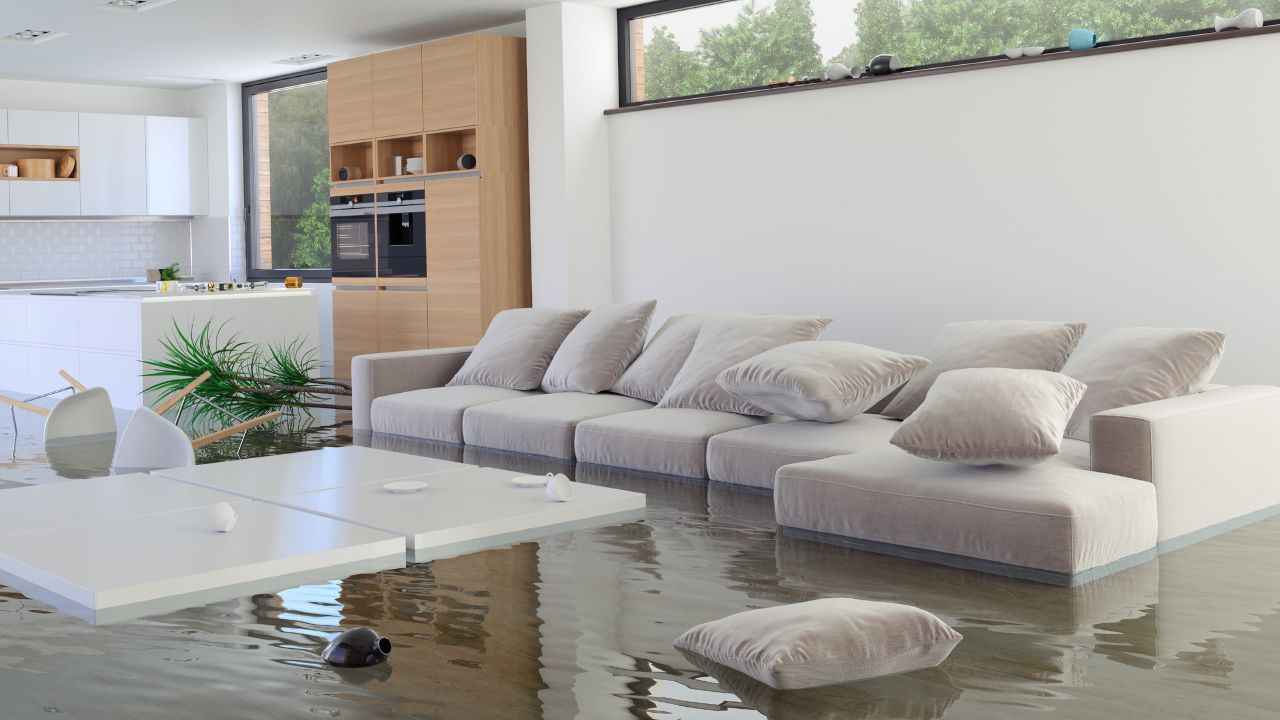How To Check if Your House is in a Flood Zone In South Carolina
See How We're Different
or call us: 864-626-6181
If you live in South Carolina, it is essential to know whether your house is located in a flood zone. Being in a flood zone can have significant implications for your property and your safety. In this article, we will explain how you can check if your house is in a flood zone in South Carolina.
Understanding Flood Zones in South Carolina
Definition of a Flood Zone
Before we delve into the process of checking flood zones, let's first define what a flood zone is. A flood zone is an area that is prone to flooding, whether from rivers, lakes, ocean tides, or heavy rainfall. These areas are determined based on historical data and the likelihood of flooding occurring in the future.
Flooding can have devastating effects on both the natural environment and human settlements. It can lead to property damage, displacement of residents, disruption of transportation systems, and even loss of life. Understanding flood zones is crucial for individuals, communities, and governments to mitigate the risks associated with flooding.
Different Types of Flood Zones in South Carolina
In South Carolina, flood zones are classified into different categories, each indicating the level of flood risk in that particular area. The Federal Emergency Management Agency (FEMA) designates these flood zones based on extensive research and analysis.
The various flood zone classifications in South Carolina include:
Zone A: Special Flood Hazard Area (SFHA) subject to high flood risk
Zone A is considered a Special Flood Hazard Area (SFHA) and is characterized by a high flood risk. These areas are prone to frequent and severe flooding, making them particularly vulnerable. It is crucial for residents and property owners in Zone A to take necessary precautions and have appropriate flood insurance coverage.
Zone AE: SFHA with a base flood elevation determined
Zone AE is also classified as a Special Flood Hazard Area (SFHA) and has a base flood elevation (BFE) determined. The BFE is the computed elevation to which floodwater is anticipated to rise during a base flood. This information helps in determining the appropriate construction and insurance requirements for buildings in this zone.
Zone AH: SFHA where shallow flooding can occur
Zone AH is another Special Flood Hazard Area (SFHA) where shallow flooding can occur. These areas are prone to shallow water depths, typically between one and three feet, during flooding events. Although the water depths may not be as high as in other flood zones, it is still essential to take necessary precautions to protect life and property.
Zone X: Area of minimal flood risk
Zone X is an area of minimal flood risk. While these areas are considered to have a lower risk of flooding, it is important to note that they are not entirely immune to flood events. It is still advisable for residents and property owners in Zone X to consider flood insurance coverage, as flooding can occur even in areas with minimal risk.
Understanding the different flood zones in South Carolina is vital for individuals, communities, and local authorities to make informed decisions regarding land use, development, and emergency preparedness. By being aware of the flood risk in a particular area, appropriate measures can be taken to minimize the potential impact of flooding and ensure the safety and well-being of the residents.
Importance of Knowing Your House's Flood Zone
Understanding the potential risks and damages that your property may face during a flood is essential for every homeowner. By being aware of your house's flood zone, you can take necessary precautions to protect your home and belongings effectively.
When your house is located in a high-risk flood zone, it means that it is more susceptible to flooding. This increased vulnerability can lead to significant damages, such as structural damage to your home's foundation, walls, and floors. Additionally, it can result in the destruction of valuable possessions, including furniture, appliances, and personal belongings.
Moreover, the potential risks associated with living in a high-risk flood zone extend beyond the physical damages. Flooding can also pose health hazards due to the contamination of water with sewage, chemicals, and other harmful substances. These contaminants can jeopardize the safety and well-being of you and your family members.
Insurance Implications
Knowing your house's flood zone is not only crucial for protecting your property but also for understanding the impact it has on your insurance coverage. Insurance companies rely on flood zone information to assess the level of risk associated with your property and determine the cost of flood insurance premiums.
Living in a high-risk flood zone often translates into higher insurance rates. This is because the likelihood of filing a claim for flood-related damages is higher in these areas. Insurance providers consider factors such as the elevation of your property, proximity to water bodies, and historical flood data to calculate the risk and determine the premiums.
On the other hand, if your house is located in a low-risk flood zone, you may benefit from lower insurance premiums. Insurance companies perceive these areas as having a reduced likelihood of flooding, resulting in a lower risk of claims being filed.
It is important to note that flood insurance is not typically covered under standard homeowners' insurance policies. Therefore, if you reside in a flood-prone area, having flood insurance is crucial to protect your investment and ensure financial security in the event of a flood.
By understanding the insurance implications of your house's flood zone, you can make informed decisions regarding the coverage you need and the steps you should take to mitigate potential damages.
How to Determine Your House's Flood Zone
Using Online Tools and Resources
In the digital age, checking flood zone information has become more accessible than ever. Numerous online tools and resources can help you determine your house's flood zone in South Carolina. Websites like FEMA's Flood Map Service Center and the South Carolina Department of Natural Resources provide interactive maps where you can enter your address and check the flood zone classification for your area.
When using online tools to determine your house's flood zone, it is important to understand the different classifications and what they mean. Flood zones are categorized based on the likelihood of flooding in a particular area. The most common flood zones include:
- Zone A: Areas with a high risk of flooding, often located near bodies of water such as rivers, lakes, or coastlines.
- Zone B: Areas with a moderate risk of flooding, typically located near Zone A areas or in low-lying areas.
- Zone C: Areas with a minimal risk of flooding, usually located farther away from bodies of water.
- By using online tools, you can easily determine which flood zone your house falls into and understand the potential risks associated with it. It is important to note that flood zones can change over time due to factors such as climate change, urban development, or changes in water flow patterns.
Consulting with Local Authorities
If you prefer a more personal approach, you can reach out to your local authorities, such as your city or county planning department. They will have flood zone maps and can assist you in determining the flood zone status of your house.
When consulting with local authorities, it is beneficial to gather additional information about flood mitigation measures and resources available in your area. They can provide guidance on flood insurance options, emergency preparedness plans, and community initiatives aimed at reducing the impact of flooding.
Local authorities may also have access to historical flood data and can provide insights into the frequency and severity of past flooding events in your area. This information can help you make informed decisions about flood protection measures for your home.
Additionally, engaging with local authorities allows you to contribute to community efforts in addressing flood-related issues. By staying informed and actively participating in discussions and initiatives, you can play a role in shaping flood management strategies and advocating for the well-being of your neighborhood.
Interpreting Flood Zone Information
Understanding Flood Zone Codes
Once you have determined your house's flood zone, it is essential to understand the flood zone codes associated with it. Each flood zone has a specific code that provides additional information about the flood risk and requirements for flood insurance.
Flood zone codes are designed to help homeowners and insurance companies assess the potential risks and take appropriate measures to protect their properties. These codes are based on extensive research and analysis of historical flood data, topography, and hydrological factors.
For example, Zone A and AE are considered high-risk flood zones. These areas are more susceptible to flooding due to their proximity to rivers, coastlines, or other bodies of water. Properties located in these zones may have a higher chance of experiencing flooding during heavy rainfall, storm surges, or hurricanes.
On the other hand, Zone X signifies a lower risk of flooding. These areas are typically located further away from major water sources and have a lower probability of experiencing significant flood events. However, it's important to note that even properties in Zone X can still be at risk during extreme weather conditions or if there are drainage issues in the area.
Evaluating Flood Risk Based on Zone Classification
Understanding the flood risk based on your zone classification is crucial. High-risk flood zones, such as Zone A and AE, indicate a higher probability of flooding, while Zone X signifies a lower risk.
In South Carolina, coastal areas and regions near major rivers are more prone to flooding, often classified as high-risk flood zones. This is due to the state's geography and its susceptibility to tropical storms and hurricanes. The combination of heavy rainfall and storm surges can lead to significant flooding in these areas.
However, it's important to remember that flooding can occur in any part of the state during severe weather events or prolonged rainfall. Factors such as poor drainage systems, urban development, and changes in land use can also contribute to localized flooding in areas that are not typically considered high-risk flood zones.
When evaluating flood risk, it's crucial to consider not only the flood zone classification but also other factors such as elevation, proximity to water sources, and the presence of flood control measures. These additional factors can provide a more comprehensive understanding of the potential flood risk for a specific property.
By understanding flood zone codes and evaluating flood risk based on zone classification, homeowners can make informed decisions regarding flood insurance, property protection measures, and emergency preparedness. It is always advisable to consult with local authorities, insurance agents, and floodplain management experts to get accurate and up-to-date information about flood risks in your area.
Precautions to Take if Your House is in a Flood Zone
Home Improvement Measures for Flood Prevention
If your house is in a flood zone, there are several home improvement measures you can take to mitigate potential flood damage. These include elevating your home, installing flood-resistant materials, and ensuring proper drainage systems.
Emergency Preparedness Tips
Being prepared for a flood is crucial for your safety and the protection of your property. Develop an emergency plan, create a disaster supply kit, and stay informed about flood warnings and evacuation orders.
In conclusion, knowing if your house is in a flood zone in South Carolina is essential for various reasons. By understanding flood zone classifications, utilizing online tools or consulting local authorities, and taking necessary precautions, you can better protect yourself, your loved ones, and your property from the potential dangers of flooding. Stay informed and be proactive in ensuring the safety and resilience of your home.







